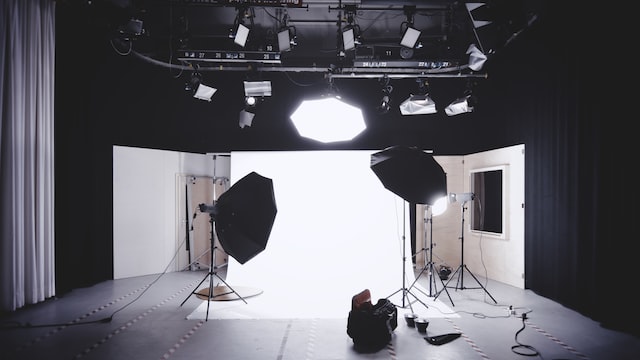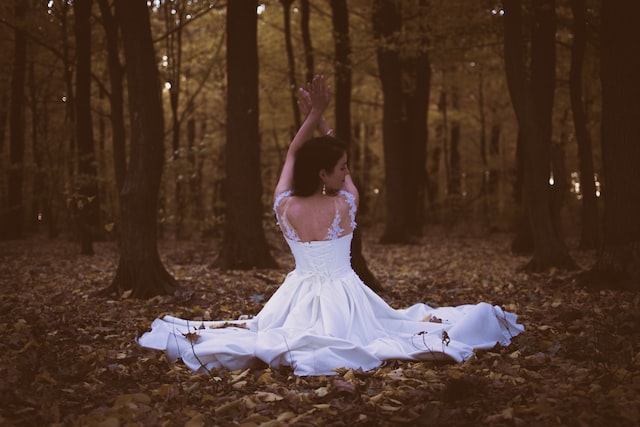Photography and Mental Health
Photography helps spotlight good things that have happened to you, boosts your sense of value, and even lowers the stress hormone cortisol. And as it turns out, having a camera in your hand gives you a unique perspective.
This week, Kathryn Chapman joined me on the podcast. She is an amazing photographer with an incredible story. Kathryn started out working as a freelance photographer and was also going through her own mental health journey. To face her depression, she decided to look herself in the eye - literally and figuratively. Through taking self-portraits, she wanted to face herself and her depression fully.
She discovered a new and unexpected way to see herself as she began to explore her own images. Kathryn saw a woman who was suffering, but yet, she was not upset by what she saw. She didn't see ugliness, or defeat, just a woman in pain.
Kathryn decided to make changes for herself and she tracked the changes within her through her photos and self-portraits.
Photos for Healing
She is now on a mission to create change for as many women as she can. Through her Face-to-Face shoots and Freedom shoots, she is able to record women, reflecting back to them a unique moment in their lives. She has certainly discovered her passion and through her work, she helps women see themselves and come face to face with who they truly are.
“The moment the shutter clicked, I felt a shift within me.”
- Bryce Evans
By enhancing self-esteem, creativity, intelligence, and decision-making as well as serving as a way to concentrate and de-stress from the demands of daily life, photography can improve your overall well-being. I have never thought of a connection between photography and mental health until I met Kathryn. And I was genuinely curious to find out more about her amazing work.
What is Photography?
Therapeutic photography could be used for your own personal healing or well-being. It may not yet be a widely-used therapy tool, but taking photos or having your photo taken can be very healing and help us process traumatic events or experiences.
Landscape photography can be part of this healing journey. For example, Kathryn reconnects women with nature, by placing them into stunning landscapes. In rediscovering their connection to their roots, women can find healing through the sounds and smells of nature, as well as feeling the many unique textures that can be found outside. Either clothed or unclothed, women can truly connect with nature’s wild beauty and find healing and comfort in our Mother Earth.

Kathryn also uses portrait photography, also known as portraiture, to capture a moment in time. Portrait photography can be used professionally, to take a headshot for a company website or a school yearbook. It can also be used as a chronological record of your life - a series of pictures as you mature and age. This was a popular choice throughout history, although as paintings and not photographs.
In Kathryn’s case, portrait photography captures women as they look and feel at a certain time. This might include during times of loss or grief, and also during times of depression or anxiety. Seeing yourself in this way, in an intimate photo, truly reflects your struggles at the time and shows how you change over time, as you heal.
Photography And mental health
Take out your camera, pick a day and give yourself permission to lose yourself in a brief photo session. You can even just pull out your phone and off you go. Not only can this help you overcome any sense of hesitation or helplessness, but viewing the photos you have shot can also increase your confidence and self-esteem.
It's crucial to become aware of your feelings when experiencing mental distress. Photography forces us to confront ourselves during the mental health journey, while also allowing us to explore how we feel and how we appear as we battle and as we recover. A picture can be such a powerful mirror of what we are going through and also a reflection of how we change as we heal.

Creative Expression for Mental Health
As a means of self-expression, photography may be the most significant approach to improve your mental health. You can come up with creative methods to use your pictures to convey your feelings and experiences. Self-portraits with props are a great way to use your art to really get to the heart of your issues. Even if you don't feel like staging elaborate photography sets, you may still look back on your daily life through a photo journal.
Like any creative art form, photography may be a great way to create a unique window into your world that could otherwise stay hidden. You can process difficult times through recording them in photos. In addition, you could also use photography to find a moment of stillness. The focus is simply on you and what you are taking pictures of. This could even be a form of self-care that could benefit your mental health greatly. And you don’t have to be a professional photographer to get started. A phone and some time to find things you would like to photograph is all you need.
Finding an amazing photographer
Not every photographer does what Kathryn does. She is unique in that she is informed through her own mental health journey, which gives her powerful insight into what women are experiencing. And how photography can be used for their healing journey.
Kathryn offers Freedom Shoots, which include landscape photography, and Face-to-Face Shoots, which are individual portrait sessions. Her preparation for these sessions is lengthy and detailed. She helps interested clients prepare for the shoots and then gives them a lot of time, often months, to view their photos and absorb what they are feeling and experiencing.
Journaling and communication are two things that work well with photography and for Kathryn, preparing for a shoot entails getting to know the client and establishing a safe environment for them. As a result, a mutual trust and understanding is developed that Kathryn’s shoots provide a safe space to let go. She makes the shoot as simple and carefree as possible and makes great efforts to accommodate her client's wishes and values.

A Safe Space
Some clients are very shy and nervous and Kathryn helps her clients with techniques for clearing their “inner critic”, calming down, and revealing their true inner nature for the shoots. A lot of the preparation work done in advance includes inner work, to help the client feel comfortable to let go during the shoots. Of course, there is also style, which helps some clients access their feelings more easily. And Kathryn provides stunning gowns and outfits, which is usually a lot of fun for the client.
In a Face-to-Face shoot, which is an intimate portrait of the client, women share their stories throughout the shoot because the emphasis is very much on what is present emotionally. It is about changing your perspective, accepting yourself, and truly realizing that all of your parts are important and need to be seen, heard, and loved. This includes your inner critic and parts of you that you may be critical of.
Photographers work in the moment, so if you're having a tough day or going through something challenging, the more authentic you can be, the better. It's important to feel your emotions and not think about it too much. Every emotion is valid and should be documented on camera so you can look back and realize how magnificent you are. We are all beautiful in our unique ways and our emotional and physical journeys warrant being seen.
The Takeaway
Throughout my interview with Kathryn, it became apparent that photography can have such positive effects on our minds. For many of us, photography offers a wonderful outlet, whether it's the chance to briefly divert our attention from our problems or the idea that taking pictures outside encourages us to engage with others and our own bodies in important ways.
The simple act of creating has a significant role in fostering fulfillment. Maybe you can remember a picture you drew as a child and how proud you were after your parents proudly put it up on the fridge. Maybe they couldn’t exactly tell what you drew, but it was the simple fact that your expression was recognized that made you just a little bit more confident.

Express Yourself!
Regardless of age, most people have this passion for creating and expressing. We enjoy looking at landscape images because they mentally take us to far-away places we want to holiday at. And doing self-portraiture has the same effect. We come to accept what we see in front of us and over time, we can see the profound changes that happen to us in life.
Through photography, we may also learn how strong we really are.
Sometimes I look back at pictures that were taken during a difficult time, and I am so proud of coming through those times. We often gloss over the beauty and strength within us, but pictures capture that short moment in time. For Kathryn, she loves the moments where she witnesses people perceive themselves as bold, courageous, and vulnerable for the first time in their lives. It’s like a secret door that clients open just a bit and the photo gives a small glimpse into that secret world.
Photography can truly be life-changing and if you live near Kathryn, you can try one of her magical shoots for yourself!
Chiriboga, B., Cruz, V., Collavo, N., & Eferighe, J. (2021, May 17). 5 mental health photographers capturing the importance of MHAM. Kulture Hub. Retrieved September 17, 2022, from https://kulturehub.com/mental-health-photographers-importance/
Djudjic, D. (2022, March 14). 25% photographers face mental health issues, new study shows. DIY Photography. Retrieved September 17, 2022, from https://www.diyphotography.net/25-photographers-face-mental-health-issues-new-study-shows/
Green, G., & Scott, L. (2022, May 9). Mental Health Awareness Week: Why taking photos improves your wellbeing. Digital Camera World. Retrieved September 17, 2022, from https://www.digitalcameraworld.com/features/can-photography-improve-your-mental-health
Photography as therapy: Why taking photos can actually improve your mental health. (n.d.). Canva. Retrieved September 17, 2022, from https://www.canva.com/learn/photography-as-therapy/
The Benefits of Photography on Mental Health, Perspective and Life. (n.d.). PhotoJeepers. Retrieved September 17, 2022, from https://photojeepers.com/benefits-of-photography-mental-health/
What are the benefits of photography on mental health? (n.d.). photoGuard. Retrieved September 17, 2022, from https://www.photoguard.co.uk/mental-health-photography
https://thejornipodcast.com/episode-23-photography-and-mental-health-with-kathryn-chapman
Aranda, K., De Goeas, S., Davies, S., Radcliffe, M., & Christoforou, A. (2015). Let's go outside: using photography to explore values and culture in mental health nursing. Journal of Psychiatric and Mental Health Nursing, 22(5), 306-315.
Buchan, C. A. (2020). Therapeutic benefits and limitations of participatory photography for adults with mental health problems: A systematic search and literature review. Journal of Psychiatric and Mental Health Nursing, 27(5), 657-668.
Byrne, E. (2014). Visual data in qualitative research: The contribution of photography to understanding the mental health hospital environment (Doctoral dissertation, University of the West of England).
Charles, A., & Felton, A. (2020). Exploring young people’s experiences and perceptions of mental health and well‐being using photography. Child and Adolescent Mental Health, 25(1), 13-20.
Stevens, R., & Spears, E. H. (2009). Incorporating photography as a therapeutic tool in counseling. Journal of Creativity in Mental Health, 4(1), 3-16.
